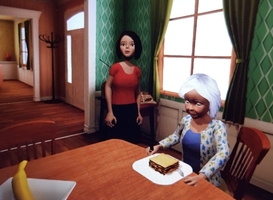A European consortium consisting of health experts, experts in the design and development of digital health innovations, primary care and narrative simulation experts from Switzerland, the Netherlands, Romania and Belgium, is developing the Alzheimer Care Trainer, a serious game to train informal caregivers in their communication and behavior in the Alzheimer’s disease. BRUSANO reports this.
–
The Alzheimer Care Trainer (ACT) is a personalized 3D simulation that helps caregivers practice everyday care situations before effectively performing care tasks. With the help of this new application, people can learn or improve skills to better deal with the changing behavior of people living at home with Alzheimer’s. In this way the best interaction style can be determined.
Specific features of the Alzheimer Care Trainer
Caregivers find the behavioral symptoms and difficulties in performing daily activities the most problematic. As the symptoms worsen, the need for care increases. It is often a question of finding the right balance between ‘taking care of someone effectively’ and ‘enjoying life together’. In the case of insufficient knowledge and training or lack of experience, the inability of the caregiver to adopt the correct behavior can often be a source of tension and emotional stress. Information and education through Alzheimer’s and dementia associations, support and various aids are essential for this. To help realize this balanced care relationship, the Alzheimer Care Trainer can also offer relief.
Unique to this game is the personalized simulation where the player enters a virtual 3D environment. There are protagonists who guide the player through all scenarios. The user can set the simulation to the profile of the person in need of care by completing questionnaires about the (virtual) patient and the user, such as symptoms and the stage of the disease. Depending on the choices, the game develops further and the storyline changes.
Ambition of the Alzheimer Care Trainer
The application hopes to improve interpersonal communication and initiate pedagogically appropriate behavior. In the long term, it aims to reduce care-related stress and thus improve quality care in the long term. The person in need of care could stay longer in the familiar home situation, so that all those involved enjoy each other’s company for longer.
By: Nationale Zorggids
–


